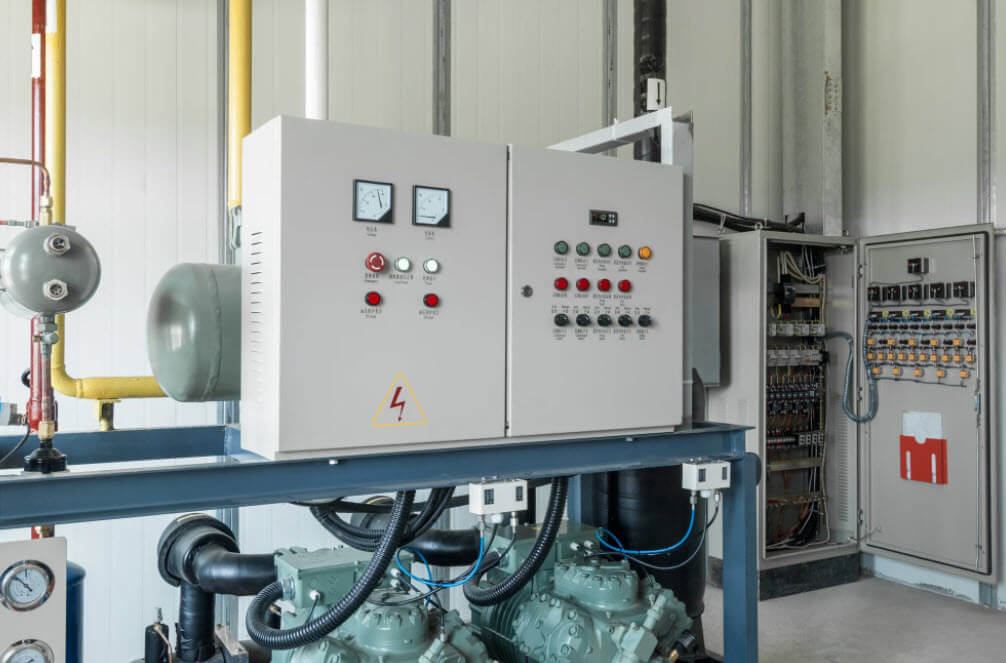Control Panel Building: Reliable Industrial Automation

Control panel building is a crucial component of any industrial automation system, serving as the central hub where electrical power, control devices, and system communication come together. From managing simple machine operations to coordinating complex manufacturing processes, custom-built control panels ensure safety, efficiency, and seamless system integration.
Every successful automation project starts with a well-designed and properly built control panel. It’s where hardware meets functionality, allowing sensors, PLCs, VFDs, relays, and other components to work together in harmony. Whether for manufacturing, utilities, HVAC systems, or water treatment facilities, control panel building is the foundation that keeps industrial operations running smoothly.
What Is Control Panel Building?
Control panel building refers to the design, assembly, wiring, and testing of electrical control panels that house the components used to operate machinery and processes. These panels are carefully engineered to meet industry standards and tailored to the specific needs of each application.
Control panels typically include:
-
Programmable Logic Controllers (PLCs)
-
Relays and Contactors
-
Variable Frequency Drives (VFDs)
-
Power Distribution Blocks
-
HMI Screens (Human-Machine Interfaces)
-
Fuses, Breakers, and Terminal Blocks
Each component is installed and wired inside a protective enclosure designed to withstand the operating environment, whether it’s a factory floor, outdoor facility, or hazardous location.
Why Custom Control Panel Building Matters
Choosing custom control panel building over generic or off-the-shelf panels provides numerous advantages, especially when tailored to your system’s specific requirements:
-
Improved Efficiency: Panels are designed for optimized workflow and equipment performance.
-
Enhanced Safety: Proper component selection and layout reduce risks of electrical hazards and system failure.
-
Compliance: Custom panels are built to meet standards such as UL508A, NEC, and NFPA guidelines.
-
Scalability: Panels can be designed with future system expansion in mind.
-
Serviceability: Clean wiring and organized layouts make troubleshooting and maintenance easier.
With the right design and craftsmanship, control panels can significantly reduce downtime and extend the life of your automation system.
Your Trusted Partner in Control Panel Building
When it comes to precision, quality, and reliability in control panel building, Xtreme Automation LLC is a name you can trust. Their team of skilled engineers and technicians specialize in designing and fabricating custom control panels for a wide range of industries, including manufacturing, energy, water treatment, and HVAC systems.
Xtreme Automation LLC delivers comprehensive panel services, including:
-
Custom design based on system requirements
-
UL508A-certified panel building
-
PLC and HMI integration
-
Full testing and quality assurance before deployment
-
On-site installation and commissioning
-
Ongoing support and troubleshooting
With their expertise and commitment to excellence, Xtreme Automation LLC ensures every control panel is built to the highest standards—functioning flawlessly from day one.
Industries That Rely on Control Panel Building
Control panels are essential across many industrial sectors. Here’s how different industries use them:
-
Manufacturing: Control motor drives, conveyors, and production lines with precision and flexibility.
-
Water & Wastewater: Monitor pump stations, chemical feeds, and filtration systems.
-
Oil & Gas: Manage remote operations, pressure controls, and safety systems.
-
Food & Beverage: Maintain quality control, batch processing, and sanitation systems.
-
Building Automation: Integrate HVAC, lighting, and access systems under centralized control.
Every industry has its own set of challenges, and that’s why custom control panel building is so valuable—it’s tailored for the task.
Key Considerations in Control Panel Building
When planning a control panel project, several factors must be taken into account to ensure long-term performance and safety:
-
Environment: Panels should be built to withstand conditions like moisture, dust, vibration, or extreme temperatures.
-
Component Quality: Using trusted brands and industrial-grade parts improves system reliability.
-
Layout and Design: Proper spacing, labeling, and wire routing make panels easier to maintain and expand.
-
Testing and Validation: Pre-installation testing ensures the panel functions correctly and safely before it reaches the field.
Working with a knowledgeable team like XtremeAutomationLLC ensures every detail is addressed from design to deployment.
The Future of Control Panel Technology
As industrial automation continues to evolve, so does the technology behind control panel building. Modern panels now include:
-
Remote Monitoring Capabilities
-
IoT and Edge Computing Integration
-
Touchscreen HMIs for User-Friendly Interfaces
-
Energy-Efficient Components
-
Smart Diagnostics and Alerts
Staying ahead of these trends can make a huge difference in how efficiently and safely your facility operates.
Conclusion
Control panel building is more than just assembling wires and switches—it's about engineering reliable, efficient, and safe systems that keep your operations running at their best.




